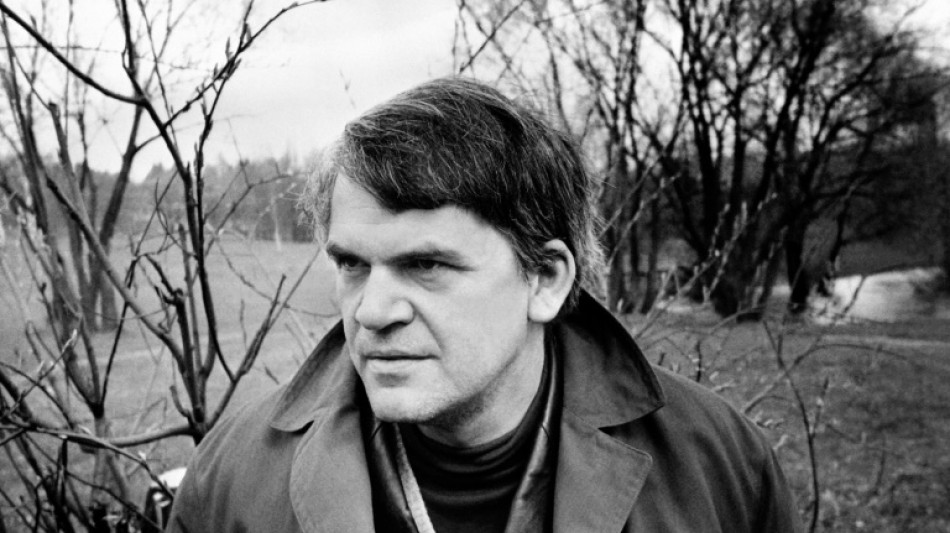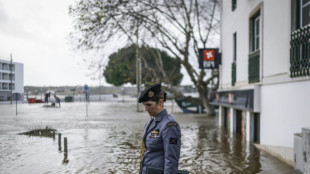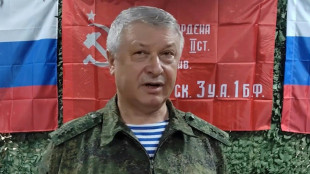
-
 German exports to US plunge as tariffs exact heavy cost
German exports to US plunge as tariffs exact heavy cost
-
Portugal heads for presidential vote, fretting over storms and far-right

-
 Suicide blast at Islamabad mosque kills at least 30, wounds over 130: police
Suicide blast at Islamabad mosque kills at least 30, wounds over 130: police
-
Russia says Kyiv behind Moscow shooting of army general

-
 Greenland villagers focus on 'normal life' amid stress of US threat
Greenland villagers focus on 'normal life' amid stress of US threat
-
Iran, US hold talks in Oman after Trump military threats

-
 Stocks waver as tech worries build
Stocks waver as tech worries build
-
Dupont, Jalibert click to give France extra spark in Six Nations bid

-
 'Excited' Scots out to prove they deserve T20 World Cup call-up
'Excited' Scots out to prove they deserve T20 World Cup call-up
-
EU tells TikTok to change 'addictive' design

-
 India captain admits 'there will be nerves' at home T20 World Cup
India captain admits 'there will be nerves' at home T20 World Cup
-
Stellantis takes massive hit for 'overestimation' of EV shift

-
 'Mona's Eyes': how an obscure French art historian swept the globe
'Mona's Eyes': how an obscure French art historian swept the globe
-
Iran, US hold talks in Oman

-
 Iran, US hold talks in Oman after deadly protest crackdown
Iran, US hold talks in Oman after deadly protest crackdown
-
In Finland's forests, soldiers re-learn how to lay anti-personnel mines

-
 Israeli president visits Australia after Bondi Beach attack
Israeli president visits Australia after Bondi Beach attack
-
In Dakar fishing village, surfing entices girls back to school

-
 Lakers rally to beat Sixers despite Doncic injury
Lakers rally to beat Sixers despite Doncic injury
-
Russian pensioners turn to soup kitchen as war economy stutters

-
 Japan taps Meta to help search for abuse of Olympic athletes
Japan taps Meta to help search for abuse of Olympic athletes
-
As Estonia schools phase out Russian, many families struggle

-
 Toyota names new CEO, hikes profit forecasts
Toyota names new CEO, hikes profit forecasts
-
Next in Putin's sights? Estonia town stuck between two worlds

-
 Family of US news anchor's missing mother renews plea to kidnappers
Family of US news anchor's missing mother renews plea to kidnappers
-
Spin woes, injury and poor form dog Australia for T20 World Cup

-
 Japan's Liberal Democratic Party: an election bulldozer
Japan's Liberal Democratic Party: an election bulldozer
-
Hazlewood out of T20 World Cup in fresh blow to Australia

-
 Japan scouring social media 24 hours a day for abuse of Olympic athletes
Japan scouring social media 24 hours a day for abuse of Olympic athletes
-
Bangladesh Islamist leader seeks power in post-uprising vote

-
 Rams' Stafford named NFL's Most Valuable Player
Rams' Stafford named NFL's Most Valuable Player
-
Japan to restart world's biggest nuclear plant

-
 Japan's Sanae Takaichi: Iron Lady 2.0 hopes for election boost
Japan's Sanae Takaichi: Iron Lady 2.0 hopes for election boost
-
Italy set for 2026 Winter Olympics opening ceremony

-
 Hong Kong to sentence media mogul Jimmy Lai on Monday
Hong Kong to sentence media mogul Jimmy Lai on Monday
-
Pressure on Townsend as Scots face Italy in Six Nations

-
 Taiwan's political standoff stalls $40 bn defence plan
Taiwan's political standoff stalls $40 bn defence plan
-
Inter eyeing chance to put pressure on title rivals Milan

-
 Arbeloa's Real Madrid seeking consistency over magic
Arbeloa's Real Madrid seeking consistency over magic
-
Dortmund dare to dream as Bayern's title march falters

-
 PSG brace for tough run as 'strange' Marseille come to town
PSG brace for tough run as 'strange' Marseille come to town
-
Japan PM wins Trump backing ahead of snap election

-
 AI tools fabricate Epstein images 'in seconds,' study says
AI tools fabricate Epstein images 'in seconds,' study says
-
Asian markets extend global retreat as tech worries build

-
 Sells like teen spirit? Cobain's 'Nevermind' guitar up for sale
Sells like teen spirit? Cobain's 'Nevermind' guitar up for sale
-
Thailand votes after three prime ministers in two years

-
 UK royal finances in spotlight after Andrew's downfall
UK royal finances in spotlight after Andrew's downfall
-
Diplomatic shift and elections see Armenia battle Russian disinformation

-
 Undercover probe finds Australian pubs short-pouring beer
Undercover probe finds Australian pubs short-pouring beer
-
Epstein fallout triggers resignations, probes


Satire and poetry: Milan Kundera took on life's absurdity
Milan Kundera, the author of "The Unbearable Lightness of Being" whose dark, provocative novels delved into the enigma of the human condition, has died, a spokeswoman for the Milan Kundera Library in his native city of Brno said on Wednesday. He was 94.
"Unfortunately I can confirm that Mr Milan Kundera passed away yesterday (Tuesday) after a prolonged illness," she told AFP.
Kundera died at his apartment in Paris, France, his adoptive country where he had lived since his emigration from Communist-ruled Czechoslovakia in 1975.
"Not only Czech literature, but world literature as well has lost one of the greatest contemporary writers, and one of the most translated writers too," Tomas Kubicek, director of the Kundera library, told the public Czech TV.
Czech Prime Minister Petr Fiala said Kundera was able to "appeal to whole generations of readers across all continents" with his work.
Kundera was frequently touted as a favourite to win the Nobel Prize for literature, but he never claimed the coveted honour.
Through his characteristic satire and poetic prose, Kundera had sought to express all that is compelling and absurd about life, drawing on his own experiences of being stripped of his Czech nationality for dissent.
Life, he said in his work of criticism "Art of the Novel" (1986), "is a trap we've always known: we are born without having asked to be, locked in a body we never chose, and destined to die."
- Young rebel -
Kundera was born on April 1, 1929, in the town of Brno, in what was then Czechoslovakia. His father was a famous pianist.
He studied in Prague, where he joined the Communist Party, translated the French poet Apollinaire and wrote poetry of his own.
He also taught at a film school where his students included the future Oscar-winning director Milos Forman.
Although he professed faithfulness to Communism, the independent spirit of Kundera's writing soon got him into trouble.
He was expelled from the party in 1950, re-joined in 1956 and was expelled a second time in 1970 after the Prague Spring reform movement -- in which he was seen as playing a role -- was crushed.
- Locked out -
Kundera's first novel "The Joke", a work of dark humour about the one-party state published in 1967, led to a ban on his writing in Czechoslovakia while also making him famous in his homeland.
In 1975, he and his wife Vera went into exile in France, where he worked for four years as an assistant professor at the University of Rennes. They were stripped of their Czech nationality in 1979.
In his adopted home, where he became a citizen in 1981, his reputation and success grew as translations of his novels appeared, such as "Life is Elsewhere" (1973) set in Czechoslovakia about a poet entrapped by the Communist regime.
"The Book of Laughter and Forgetting" (1979) playfully explored through seven interlinked narratives the nature of forgetting in politics, history and daily life.
The novel was "brilliant and original," said the New York Times in 1980, "written with a purity and wit that invite us directly in; it is also strange, with a strangeness that locks us out."
Kundera was an author "fascinated by sex, and prone to sudden, if graceful, skips into autobiography, abstract rumination, and recent Czech history," said the Times reviewer, John Updike.
By far his most famous work, "The Unbearable Lightness of Being" was published in 1984 and turned into a film starring Juliette Binoche and Daniel Day-Lewis in 1987.
The novel is a morality tale about freedom and passion, on both an individual and collective level, set against the Prague Spring and its aftermath in exile.
- No going back? -
Kundera's critics say he turned his back on fellow Czechs and dissidents following his exile in France and for his decision to ban the translation of his French books into Czech.
In 2008, a Czech magazine accused him of being a police informer under Communist rule, which he denied as "pure lies".
In 2013, Kundera published his first novel after a 13-year hiatus.
"The Festival of Insignificance", about five friends in Paris, received mixed reviews, with The Atlantic noting its "near-impenetrable irony" and The Guardian deeming it a "stinker".
What Kundera "has to tell us seems to have less relevance", said the New York Times. "You can’t help wondering what his evolution would have been like if he had stayed, or stayed longer, in Czechoslovakia."
In 2019, the Czech Republic restored his nationality and in 2023 the Milan Kundera Library opened in his hometown of Brno.
Z.AbuSaud--SF-PST



